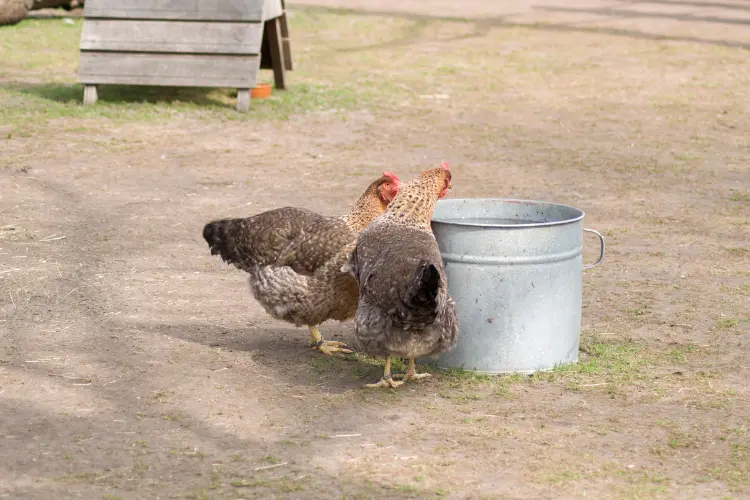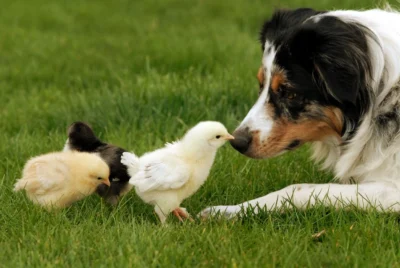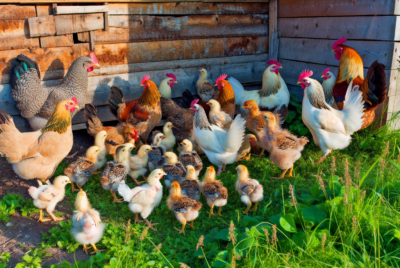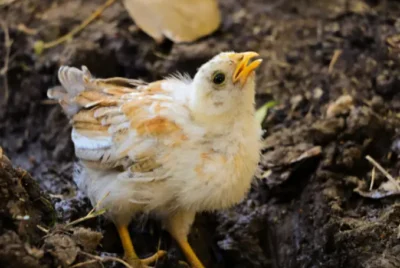How Many Days Can Chickens Survive Without Water and Food?
Think about a situation where, due to an unexpected turn of events or a simple oversight, your chickens are left without their regular food and water supply. The thought itself is unsettling for anyone who cares for these birds. It’s a critical concern: how many days can chickens actually survive under such circumstances?
This question is not just about satisfying a casual curiosity; it’s a vital aspect of responsible chicken care. The survival and well-being of your feathered flock hinge on understanding these limits and ensuring they’re never tested. So now, let’s delve deeper into this critical topic.
How Long Can Your Chickens Go Without Water?
The length of time a chicken can go without water depends on several factors, including temperature, age, health, and other environmental conditions. In general, chickens can go without water for about two days or 48 hours in ideal conditions with moderate temperatures and no heat stress.
- Temperature: Hot weather can increase a chicken’s water requirements significantly due to the risk of dehydration and heat stress. In extreme heat, chickens may only be able to survive without water for about 8 hours or less.
- Age: Baby chicks are more vulnerable to dehydration than adult chickens and can only go about 12 hours without water. Their small size and rapid growth make them more susceptible to dehydration.
- Health: The overall health of a chicken plays a role in how long it can go without water. Sick or weakened chickens may be more prone to dehydration and may not tolerate water deprivation than healthy chickens.
- Environmental conditions: Factors such as humidity levels, access to shade, and other stressors can affect a chicken’s ability to cope with water deprivation.
- Activity level: More active chickens, such as those allowed to free-range, may need more water than chickens kept in confined spaces.

Why Is Water Important To Chickens?
Water is essential for chickens for several critical reasons. Firstly, water is necessary for digestion, as it helps break down food in their gizzards, allowing them to extract nutrients efficiently.
Secondly, it is vital in regulating body temperature, especially in hot weather, as chickens pant and lose water through respiration to cool down.
Additionally, water is essential for chickens’ overall health and well-being, as it helps transport nutrients, eliminate waste products, and maintain proper bodily functions. Adequate hydration is also crucial for egg production and quality.
Is it Necessary for Chickens to Consume Water Every Day?
Water is necessary for chickens to consume water every day. Water is essential for chickens to maintain their health and well-being. They require water daily for various vital functions, including digestion, temperature regulation, nutrient absorption, waste elimination, and overall bodily processes.
Moreover, adequate hydration is especially crucial for egg production in laying hens. Chickens cannot store water in their bodies like some other an

How Much Water Do Chickens Really Need?
The amount of water that chickens need can vary widely based on several factors. However, as a general guideline:
- Adult Chickens: On average, an adult chicken typically drinks about 500 ml (approximately half a liter or a little over 1 pint) of water per day. However, this can increase in hot weather or for larger breeds.
- Broilers and Layers: Broiler chickens might consume more water compared to layers. Layers need consistent water intake to maintain egg production.
- Age and Size: Younger chickens and smaller breeds will drink less water than older or larger breeds.
- Diet: If the diet is high in water content (like fresh vegetables), they might drink slightly less. Conversely, a diet high in grains or commercial feed will increase their water needs.
- Health: Sick chickens might drink more or less water, depending on the illness.
- Temperature and Climate: In hot weather, chickens will drink more water to cool down and maintain body temperature. In colder climates, their water consumption might decrease slightly, but it’s still important to ensure water doesn’t freeze and remains accessible.
Read also: How to Keep Chicken Water from Freezing: Practical Tips for 2023
You must ensure your chickens have constant access to clean, fresh water. Chickens will drink more often in smaller quantities throughout the day, so their water supply needs to be replenished and kept clean to prevent the spread of diseases. You should also check their waterers at least once daily, and more frequently in hot weather, to ensure they are clean and filled.

How Can You Identify Dehydration in Chickens?
To identify dehydration in chickens, you can look for several key signs:
- If your chickens appear unusually lethargic, weak, or less active than normal, this could be a sign of dehydration.
- In laying hens, a noticeable drop in egg production can indicate dehydration, as water is crucial for egg formation.
- Dehydrated chickens may have sunken or dull-looking eyes.
- Normally, combs and wattles are vibrant and moist. If they appear dry or pale, it could be a sign of dehydration.
- Gently pinch the skin on the back of the chicken’s neck. If the skin doesn’t spring back quickly and remains tented, it’s a sign of dehydration.
- Chickens might pant and exhibit a higher heart rate when dehydrated.
- Look for changes in their droppings. Dehydrated chickens may produce less or harder droppings.
If you suspect your chickens are dehydrated, it’s important to provide them with immediate access to fresh, clean water. In severe cases, I advise consulting a veterinarian as dehydration can quickly become life-threatening. Regularly checking water supplies and ensuring they are clean and accessible can help prevent dehydration in your flock.
How Long Can Your Chickens Go Without Food?
Chickens can generally survive for about 2-3 days without food, although it’s important to note that this can lead to significant stress and health issues. Young chicks are more vulnerable and may not survive as long without food due to their rapid growth and development needs.
During times without food, chickens may exhibit behaviors like pecking at their own eggs or, in extreme cases, turning to cannibalism, especially in confined environments. While chickens are adept foragers and can find food in a free-range setting, those accustomed to regular feedings in a more controlled environment will face greater difficulty if left without a food supply.
Prolonged periods without food can result in weight loss, reduced egg production, weakened immune systems, and behavioral changes. Therefore, ensuring a consistent and nutritious diet is crucial for maintaining the well-being of chickens.
How Much Food Do Chickens Need Daily?
Chickens typically require about 1/4 to 1/3 cup (about 60 to 80 grams) of commercial poultry feed per day. However, this amount can vary depending on the breed, size, age of the chicken, and whether they are laying hens. Laying hens usually consume slightly more to support egg production.
Additionally, chickens benefit from access to forage for insects and greens, which can supplement their diet. It’s important to provide a balanced diet that meets all their nutritional needs, including protein, carbohydrates, fats, vitamins, and minerals.

How to Make Sure Your Chickens Always Have Food and Water
Ensuring that your chickens always have food and water involves a few key practices. Firstly, invest in high-quality feeders and waterers that are appropriate for the size and number of your chickens. These should be sturdy, easy to clean, and refillable to maintain a constant supply.
Place them in locations that are easily accessible to all chickens, yet protected from contamination and spillage.
For food, establish a regular feeding schedule to refill the feeders daily with the appropriate amount of feed, considering any additional foraging your chickens might do. For water, check and refill the waterers at least once a day, ensuring the water is clean and fresh.
In colder climates, prevent water from freezing using heated waterers or by regularly replacing the water. Additionally, monitor the consumption patterns of your chickens to adjust quantities as needed, ensuring they have enough food and water without encouraging waste or spoilage.
Do Chickens Need Food and Water at Night?
Chickens typically do not need access to food and water at night. They have a sleep cycle that aligns with daylight hours, meaning they naturally rest and do not feed or drink when it’s dark.
Therefore, it’s generally safe to remove food and water from the coop overnight. This practice can also help in maintaining cleanliness and deterring pests. It’s important, however, to ensure that chickens have ample access to food and water throughout the daylight hours, replenishing these as needed to support their health and wellbeing.

Conclusion
While chickens may have a surprising level of resilience, the fact remains that they cannot survive for long without food and water. Understanding this limit is more than just a piece of trivia; it’s a critical aspect of responsible chicken care.
As stewards of these creatures, we must ensure that such situations are avoided at all costs. Regular monitoring and maintenance of food and water supplies are fundamental practices in poultry keeping.
By doing so, we not only uphold the health and well-being of our chickens but also affirm our commitment to ethical and responsible animal husbandry.




